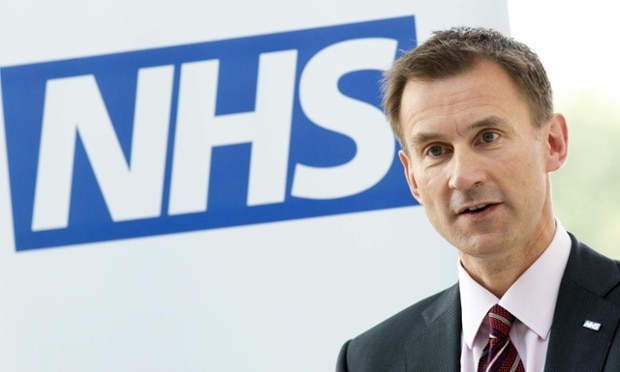
Hunt unveils £10 billion NHS savings plan
pharmafile | November 14, 2014 | News story | Sales and Marketing | Cameron, HSCIC, Hunt, Labour, NHS, burnham, digital, savings
Health secretary Jeremy Hunt has laid out efficiency plans that he hopes will save the NHS up to £10 billion by 2020.
Speaking to the King’s Fund think tank, Hunt outlined 10 ‘savings challenges’ to help contribute to the NHS goal of saving £22 billion over the course of the next parliament.
“True financial sustainability means rethinking how we spend money not just day-to-day but more fundamentally,” Hunt says.
The first challenge the health secretary identifies is to increase the safety of care and reduce the unnecessary costs of ‘preventable harm’. He points to avoidable bedsores and orthopaedic surgery infections as examples.
Similarly, he says that the “safe, effective and optimal use of medicines” forms the second challenge, and that the £300 million of yearly waste from unused drugs forms the third.
“The Academy of Royal Medical Colleges estimated that adverse drug reactions resulted in costs of £466 million through additional bed days,” Hunt goes on. “This may be the result of prescribing errors. Or clinicians may not know that a patient has an allergy. And some patients, particularly those taking multiple medicines, may find it difficult to take the right doses at the right times.
“We have already started to help systems tackle these issues through the roll out of e-prescribing systems using the Safer Hospitals, Safer Wards fund, and through more one-to-one pharmacist consultations as part of the New Medicines Service. But there is much more to do to support patients and clinicians to get the best outcomes from medicines.”
His comments arrive as a Health and Social Care Information Centre (HSCIC) report showed that English hospitals are taking an increasing share of the NHS’s bill for medicines. Hospital use represented 40.1% of the NHS’s £14.4 billion spend on drugs in 2014 – up from 37.5% in 2012-13.
The health secretary also expresses concerns over the costs of medical equipment, devices, office supplies and facilities. The NHS currently spends around $15 billion on procuring these every year, he says.
Outsourcing cuts
Hunt has also suggested that the NHS use fewer agency staff and fewer management consultants, as well as reducing back office costs, to make further savings.
“Band 5 agency nurse can cost three times more than a permanent member of staff. And data from University Hospitals Birmingham suggests that high use of temporary staffing can be a sign of poorer quality care.
“It is our doctors, nurses, healthcare assistants and managers who will create a sustainable NHS, but we won’t grip this if we try to subcontract the challenge of working out the solution.”
Savings through innovation
Hunt also wants to free up time for frontline staff, which he says can be achieved by making better use of IT and electronic records and creating a ‘paperless’ NHS by 2018 – something else he hopes will save money.
Hunt highlights one case of Google and Novartis’s in-development contact lens that helps people with diabetes monitor their blood sugar levels, as well as a hospital in Yorkshire that allows elderly people to contact nurses at any time of the day via their television.
In fact, the NHS recently announced the GPs will be encouraged to ‘prescribe’ apps to help patients self-monitor their conditions.
This increasing use of home- and self–care has led to the NHS having surplus buildings and land in many areas of the country Hunt says, and suggests that these could either be sold or used for better NHS primary care.
Criticism from Labour
But Andy Burnham, the shadow health secretary, has laid into Hunt’s plans. “The hypocrisy of Jeremy Hunt gets worse by the day,” he says. “He slashed nurse training places and left hospitals at the mercy of agencies and overseas recruitment. He should put his own house in order first.
“David Cameron spent more than £1 billion on pay-offs for NHS managers during the reorganisation – a scandalous waste of money when patient care is heading backwards.”
The chief executive of the King’s Fund Professor Chris Ham, tells the Guardian that the £10 billion savings estimate is realistic, but that it will take five years to deliver.
“It’s good that the debate is now starting about the need to look at where efficiency savings can be made,” he says, “and it’s good that the focus is on clinical care, not just back-office functions.”
George Underwood
Related Content

Digital mental health technologies – a valuable tool in supporting people with depression and anxiety
The potential benefits of digital mental health technology for managing depression, anxiety and stress, together …

A community-first future: which pathways will get us there?
In the final Gateway to Local Adoption article of 2025, Visions4Health caught up with Julian …

The Pharma Files: with Dr Ewen Cameron, Chief Executive of West Suffolk NHS Foundation Trust
Pharmafile chats with Dr Ewen Cameron, Chief Executive of West Suffolk NHS Foundation Trust, about …





